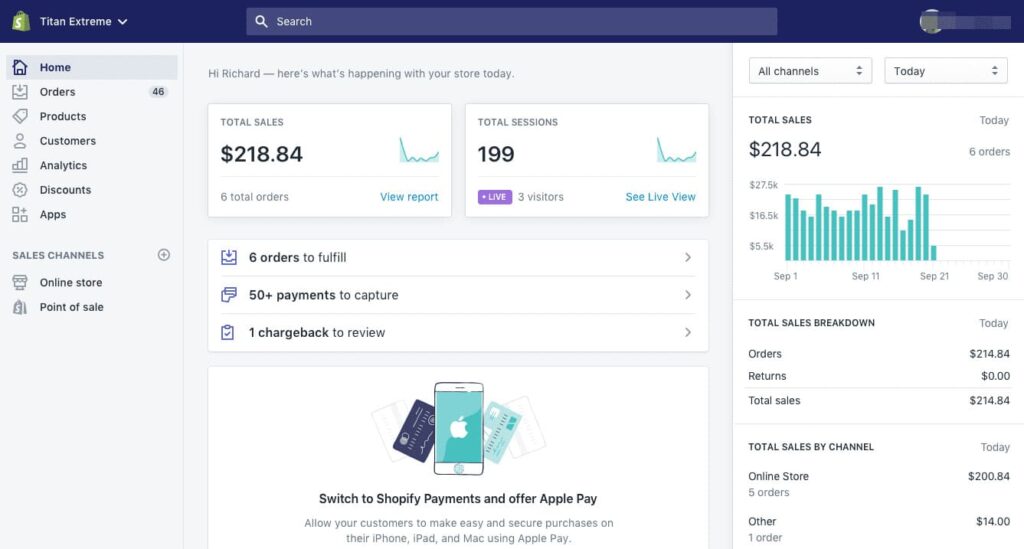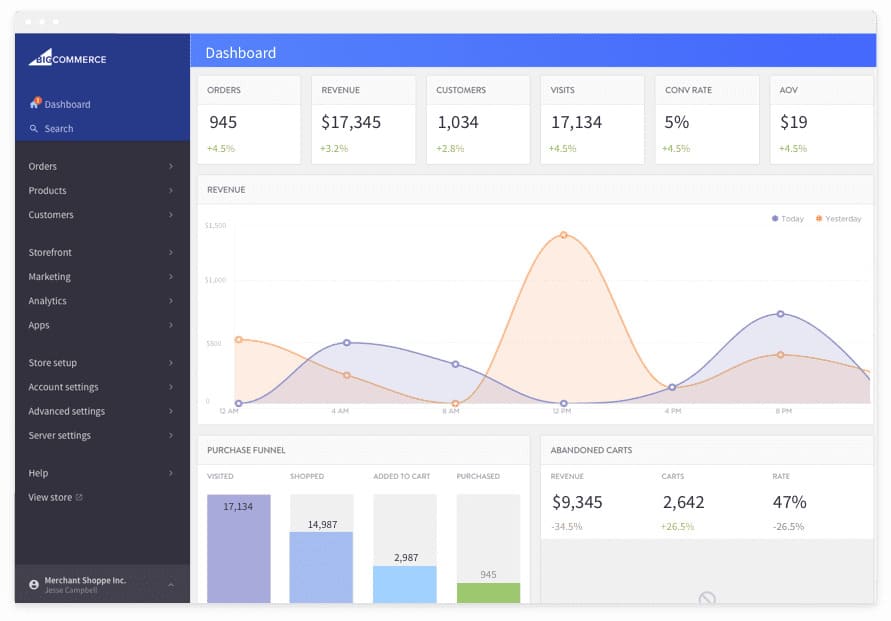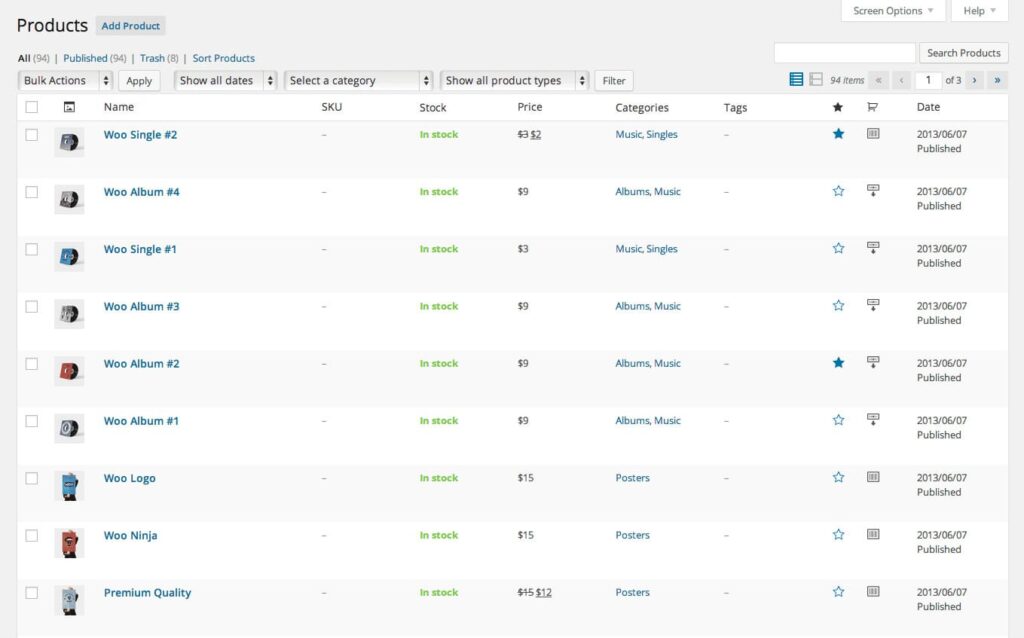Thanks to eCommerce platforms, anyone with an idea can set up a strong online store. This is awesome, especially if you’re not exactly a tech head or a design pro.
Building an online store has never been easier, but with so many different platforms to choose from, all offering similar features, it can be super confusing to pick the right one. This problem is not limited only to beginners just starting out, but it also is a pain to businesses seeking to switch to a new platform.
To make things a bit easier, we will compare the four popular eCommerce solutions: Shopify vs Bigcommerce vs Magento vs Woocommerce. Read our full analysis here to find out which one is the best bet for your business.
Shopify vs Bigcommerce vs Magento vs Woocommerce: What Are The Differences?
Table of Contents
In this comparison, we will examine four platforms: Magento vs Shopify vs Bigcommerce vs Woocommerce. We’ll break down each platform in terms of pricing, highlight features, and what customers speak highly of these solutions. By the end, you’ll get a hold of the key differences between these platforms.
Shopify
Brief Introduction
Shopify started as a simple online store that sold snowboards by three young entrepreneurs. As the trio looked for a good eCommerce solution to help their shop grow, they ran into a problem: there existed no such ready-made solution at that time. So, they decided to create their own.
Shopify was founded in 2006 and made its reputation as one of the most successful startups of the year. Fast forward to today, over 1.7 million online stores of different categories use Shopify, including big names like Tesla Motors, Budweiser, LA Lakers, the New York Stock Exchange, and Wikipedia.
Shopify is a content management system (CMS) like WordPress, but designed for creating online stores. It’s user-friendly and can be easily managed by non-programmers, allowing you to set up a functional eCommerce store in about 15 minutes.

Pricing
Shopify operates on a subscription basis, with the most popular Basic plan starting at $29 per month. This plan includes unlimited merchandise creation, unlimited file storage, discount codes, two staff accounts, and 24/7 support. Beyond that, Shopify also has three other plans catering to different businesses.
The table below summarizes the key features and suitability of each plan side by side.
| Feature | Basic Shopify | Shopify | Advanced Shopify | Shopify Plus |
| Cost | $25/month | $65/month | $399/month | $2,300/month (on a 3-year term) |
| Transaction Fees | Starts at 2% | Starts at 1% | Starts at 0.6% | Competitive rates |
| Sales Limit | No limit | No limit | No limit | No limit |
| Key Features | – 2 inventory locations
– 2 staff accounts – 24/7 chat support – Global selling (3 markets) – POS Lite – Standard checkout capacity |
– 5 inventory locations
– 5 staff accounts – 24/7 chat support – Global selling (3 markets) – POS Lite – Standard checkout capacity |
– 10 inventory locations
– 15 staff accounts – Priority 24/7 phone support – Global selling (50 markets) – POS Lite – 10x checkout capacity |
– 200 inventory locations
– Unlimited staff accounts – Dedicated account manager – Global selling (customizable) – POS Pro (200 locations) – Fully customizable (40x checkout capacity) – Wholesale/B2B available |
| Free Trial | 14 days ($1 for 1st month) | 14 days ($1 for 1st month) | 14 days ($1 for 1st month) | N/A |
| Ideal for | Solopreneurs | Small teams | Growing businesses | Complex, high-volume businesses |
Note: Paying yearly can save you 25% off the pricing package.
Pros
- Easy to set up and manage, even for non-programmers.
- Offers a wide range of themes and apps to create a unique store.
- Seamlessly connects with social media, email marketing platforms, and other popular tools.
- Hundreds of apps available to expand your store’s functionality.
- Around-the-clock customer support.
Cons
- Shopify charges a fee for every sale, which is standard among eCommerce platforms.
- The URL structure isn’t ideal for search engine optimization (SEO).
Customer Feedback
Currently, Shopify receives over 4,500 reviews on G2 – a popular platform that allows users to provide feedback and reviews about various software products. Let’s take a closer look at what Shopify customers have to say about the eCommerce solution.
What people love about Shopify:
Shopify is very user-friendly and makes it easy for any business to start and create a digital presence. From creating a website, and integrating payment gateways, to managing inventory of products and so much more. You just need to take your time to go through all their services.” — Kholizio A., on G2
I’ve been using Shopify since 2018, and I think it’s the best eCommerce platform out there. It’s very organized and has all the information that you need to process an order. We also use this to assist customers regarding their concerns about tracking, discounts, gift cards, products, etc. because it has all the information that you need.” — Jeleene May M., on G2
It is very good and simple to use, you can add all details of your products without any problem and pictures in good quality.” — Vikash K., on G2

What people dislike about Shopify:
Shopify charges an extra commission per order. That’s not the best thing when you are at scale, but it comes down if you opt for a Shopify Plus plan at scale.” — Abhinav B., on G2
Its customer support team is very poor for me. We needed help and they didn’t respond to us. They should improve customer support for better quality services.” — Vikash K., on G2
You can read all Shopify reviews on G2 here.
Bigcommerce
Brief Introduction
BigCommerce is a leading hosted, multi-channel eCommerce solution designed for merchants seeking to grow their businesses online. The platform originated from Interspire, a company founded one year after the two owners met in an online chatroom in 2003.
BigCommerce was launched in 2009. Packed with sophisticated enterprise-grade functionality, customization and performance, it is considered as a straightforward SaaS solution for enterprises to set up a strong and robust web store without needing technical skills. In 2016, the platform partnered with Amazon to provide its retailers with the capability to sync inventory across both channels.
As of 2024, BigCommerce served tens of thousands of B2C and B2B companies across 150 countries. Ben & Jerry’s, Molton Brown, S.C. Johnson, Skullcandy, SoloStove and Vodafone are among them.

Pricing
Just like Shopify, BigCommerce runs on a subscription-based pricing model and supports a 15-day free trial. Depending on your specific business needs, you can choose a Standard, Plus, Pro and Enterprise plan. The cheapest package, which is the Standard, starts at $39 per month.
| Feature | Standard | Plus | Pro | Enterprise |
| Cost | $39/month | $105/month | $399/month | Custom |
| Transaction Fees | None | None | None | None |
| Sales Limit | Up to $50,000 annually | Up to $180,000 annually | Up to $400,000 annually | Custom based on needs |
| Key Features | – Drag-and-drop builder
– 12 core features – No transaction fees |
– All Standard features
– Special credit options – Abandoned Cart Saver |
– All Plus features
– Google Customer Reviews – Multi-currency support – Marketing tools |
– All Pro features
– B2B features – Express routing – Priority support |
| Special Credit Card Rates (Optional) | PayPal and Braintree: 2.9% + $0.30 per transaction | PayPal and Braintree: 2.5% + $0.30 per transaction | PayPal and Braintree: 2.2% + $0.30 per transaction | PayPal and Braintree: Negotiable rates |
| Free Trial | 15 days | 15 days | 15 days | 15 days |
| Ideal for | Small Businesses | Growing Businesses | Larger Businesses | High-Volume Sellers & Large Corporations |
Pros
- BigCommerce includes hosting and a domain in its plans, making setup easier.
- There are lots of helpful resources and training videos to get you started.
- Built-in SEO tools help your store rank higher in search engines.
Cons
- There are fewer apps available compared to other platforms like Shopify.
- There aren’t many free themes to choose from.
- Each plan has a sales limit, which might require you to upgrade as your business grows.
Customer Feedback
Customers on G2 have shared their thoughts on what they like and dislike about BigCommerce. Overall, the platform garners 4.2 out of 5 stars from over 500 reviews.
Positives:
I love the easy-to-use platform! I can make my small business look great, without having a whole team of computer people doing the heavy lifting. I’ve been using BigCommerce since 2013, and really appreciate the value that I get, the professionalism, the support, the options of integration… pretty much everything.” — Lynn V., on G2
The SEO is set up really well to customize the URLs and also 301 redirects when things are altered.” — Shawn C., on G2
BigCommerce has given us more functionality, allowing us to grow our online presence over the last 3 years. It is easy to use and is very reliable.” — Ellen B., on G2

Negatives:
Minimal app choices and some are way too expensive. Would like to see more of a robust app store such as Shopify.” — Shawn C., on G2
They had an increase in my monthly costs within the past year… I had been paying pretty much the same thing for nearly 10 years, and was a bit flustered by the increase… But, honestly, the increase was still a GREAT BUY for what you get! That was just me being fussy.” — Lynn V., on G2
You can read all the reviews on BigCommerce on G2 here.
Magento
Brief Introduction
Founded in 2008, Magento reigns as one of the top eCommerce platforms in the world. Unlike BigCommerce and Shopify, Magento boasts an open-source nature, which allows merchants to freely customize how their online store looks and works. At the same time, its extensive library has many useful tools and plugins for marketing, search engine optimization (SEO), and managing products.
In 2015, Magento released a major update called Magento 2. This version is known for being faster, safer, and more scalable than the original, while offering better features and tools for developers.
Currently, Magento is supporting over 250,000 websites across the world, including big names like Olympus, 20th Century Fox, and Time Out. Its flexibility and scalability make Magento a sound choice for businesses of all sizes.

Pricing
Magento is available in three versions: a free edition and two paid editions. The paid versions use a license-based model, with pricing depending on your expected online revenue and the average value of each order. Costs can range from a small fee to millions of dollars per year.
Here’s a detailed breakdown of Magento’s pricing plans:
| Feature | Magento Open Source (Formerly Community Edition) | Magento Adobe Commerce (Formerly Enterprise Edition) | Magento Adobe Commerce Cloud |
| Cost | Free | Starting at $1,988/month | Starting at $3,417/month |
| Hosting | Self-hosted | Self-hosted or via third-party | Cloud hosting included |
| Key Features | – Basic eCommerce features
– Customizable store themes – SEO tools – Basic analytics – Product management |
– All Open Source features
– Advanced eCommerce features – B2B functionality – Advanced security and performance – Business intelligence – Automatic updates and patches – Customizable workflows – 24/7 customer support – Marketing tools – Personalization tools – Adobe product integrations |
– All Commerce features
– Hosting and scalability in the cloud |
| Free Trial | No | 30-day trial available | 30-day trial available |
| Suitable For | Small businesses | Medium to large businesses | Large enterprises |
It is important to note that these subscription fees haven’t covered expenses for such things as domain, maintenance and development, SSL certificates, themes and extensions yet. And if you use the Open Source and Commerce version, you will also have to pay for a hosting service.
Pros
- Lots of features built-in (multiple languages, discounts, reviews, SEO tools)
- Big stores with many products (10 to 10,000+)
- Finding help online from other users and developers
- Adding extra features with extensions
>>> At BSS Commerce, we offer a wide range of Magento extensions at reasonable prices to help enhance your store’s functionality and improve customer experiences. Explore Now! >>> BSS Commerce Magento 2 Extension Store
Cons
- Requires some tech skills to set up and use (not as easy as SaaS platforms)
- Limited free support (paid plans offer more help)
- Needs strong hosting, which can be expensive
Customer Feedback
As we navigate through over 500 reviews on G2 for either free and paid versions, we notice that most users speak highly of its extensive features, scalability, and large community. However, when comparing Magento vs Shopify vs Bigcommerce vs Woocommerce, Magento’s complexity and steep learning curve can be drawbacks.
Positives:
Its highly customizable features, secured coding architecture, and the ability to support scaling of the online store operations and inventory. The platform also has a wide range of extensions to upgrade the website.” — Ryan Patrick V., on G2
Magento is the best option if you ask for my suggestion to start an e-commerce website. It has all in built features like customer, orders, product,cart, payment and tax and shipping management. Features list is too long. Only once the technical person is required to setup on the server after that non technical persons can also use the Magento admin panel and create stunning and revenue generating websites easily.” — Charanjeet S., on G2
The inbuilt SEO and marketing tools, the scalability handling capacity of Magento Open Source is what our team liked the most.” — Pratik D., on G2

Negatives:
It is really difficult to customize. The platform requires highly experienced developers. With this requirement, the cost of developing is much higher than the other competitors.” — Ryan Patrick V., on G2
Coming from a WordPress background, this program can be a bit confusing to start. After you have been using this platform for a while, it starts to become easier and more efficient to complete your work.” — Zach P., on G2
Find all the Magento reviews on G2 here.
>>> YOU ALSO WANT TO READ: What is Magento Commerce?
Woocommerce
Brief Introduction
WooCommerce is not a standalone platform like Shopify, BigCommerce or Magento. Instead, it started as an eCommerce plugin for WordPress – the world’s leading CMS. As an open-source solution, WooCommerce lets anyone turn their WordPress site into an online store with all the necessary features.
WooCommerce was launched in 2011 by WooThemes and became part of Automattic, the parent company of WordPress, in 2015. Since its establishment, WooCommerce has proven to be the most popular addon for self-hosted WordPress websites.
Today, it powers over 24% of all online shops, with an impressive total of 14 million sites using it. Some notable names include Clickbank, Awesome Inventions, The Spectator Magazine Shop, WorthPoint and Bookriot.

Pricing
To start selling with WooCommerce is super simple. All you have to do is to choose a host and download the plugin.
WooCommerce itself is free. Anyone with a WordPress site can download and install the addon at no cost. However, you will need to pay for hosting and such things as domain registration, security, maintenance and marketing services. There are also additional expenses for certain themes, extensions and configuration assistance to make your store look and run better.
Pros
- WooCommerce has a large support community, making it easier to find help and resources.
- There are lots of themes and plugins to customize your store.
- Because it’s part of WordPress, it’s excellent for search engine optimization.
- You can sell all kinds of products and use features like discount coupons and shipping calculators.
Cons
- Sometimes WooCommerce doesn’t work well with new WordPress updates.
- It can be hard to make text and images look right without knowing some HTML.
- You have to take care of the site yourself since WooCommerce isn’t a hosted service.
- Sometimes you need to know coding to get things to look and work the way you want.
Customer Feedback
WooCommerce is rated 4.4/5 stars on G2, with over 1000 reviews highlighting its ease of use and intuitive design. It’s a great, budget-friendly eCommerce solution for building a responsive and good-looking online shop. While there is not much to dislike about the plugin itself, additional costs for extensions and hosting can be frustrating for some users.
Positives:
It’s so easy to use and implement. We all use it every day to manage the website and the great customer service and features can’t be beat for the price. It was one of the easier integration options as well.” — Charles Q., on G2
Very easy to manage my web shop and I can use it for free.” — Ahsan Habib E., on G2
It is easy to use, implement and integrate with WordPress. It has a lot of features in it. I am using it for multiple websites and projects.” — Kunal Y., on G2

Negatives:
The extensions are all priced with a SaaS model, sometimes pretty high, and you do not get much customer support. Which could be frustrating if you are a newbie to the WP ecosystem.” — Francesco G., on G2
Sometimes, third-party plugins may not work smoothly, causing challenges with certain features.” — Arun K., on G2
You can read all the reviews on WooCommerce on G2 here.
Shopify vs Bigcommerce vs Magento vs Woocommerce: The Final Verdict
Now that you understand the main similarities and differences between these four best eCommerce platforms: Magento vs Shopify vs Bigcommerce vs Woocommerce. Despite being the leading online store builders, there is no such thing as the one-size-fits-all solution. Which one to choose depends on your business size, technical skills, and specific needs.
Shopify is a budget-friendly choice for small businesses and solopreneurs. No platform can surpass Shopify when it comes to ease of use and quick setup. The platform also offers a wide theme library. There is always a free, responsive template for your product category. The only drawback is that Shopify doesn’t provide extensive customization within its standard plans.
Similarly, BigCommerce is also a SaaS platform. That means you don’t have to deal with hosting, domain registration and technical skill, making building a professional-looking online store much easier. Besides, BigCommerce has strong eCommerce features and built-in SEO tools. While it doesn’t have such an extensive theme library like Shopify, it is free of transaction fees, which is a huge plus.
Supporting various themes and extensions, WooCommerce excels at creating a beautifully-designed and high-functioning store online. It is also equipped with powerful SEO tools for store visibility and ranking on the search results page. The only downside is WooCommerce can seem quite challenging to navigate without basic coding knowledge.
Just like WooCommerce, Magento provides strong SEO features, a wide selection of themes, and extensive integrations. It is also known for its extensive customization options and scalability. Merchants can add and customize around to create a strong online presence, improve store functionalities and enhance customer experiences.
But using Magento can be difficult due to its steep learning curve. If you’re not comfortable with technical know-how, it’s best to seek help from an expert. In this regard, BSSCommerce is among the best Magento service development services in the field.
At BSSCommerce, we have a team of high-profile professionals. Whether you are looking for a Magento website development or Magento upgrade service, there is always a top-notch solution for you. We also have the Magento migration service with such an optimized process to not only deliver the new Magento 2 experience at speed but also ensure your database’s safety and accuracy.
Here’s why BSSCommerce is the top choice for the best Magento development services:
- We have 11+ years of experience implementing thousands of projects for renowned brands from 150+ countries in the world. Our proven expertise, deep understanding of the market and top-tier business knowledge make BSSCommerce stand out as the most optimal eCommerce solution.
- Integrity is one of our core values at BSS Commerce. Once the scope, pricing, and timeline are agreed upon, you can rest assured that there will be no unexpected changes. Any necessary adjustments will be communicated thoroughly and transparently in a collaborative spirit.
- BSSCommerce believes that a positive customer experience is an accurate reflection of the quality of our work. And we take great pride in our 90% customer return rate and straight five-star rating on trusted platforms like TrustPilot.

Final Thoughts
So, that concludes our comprehensive breakdown of Shopify vs Bigcommerce vs Magento vs Woocommerce. While each platform has its own strengths and weaknesses, it all comes down to a solution that suits your business best. Choosing the right one from the scratch not only helps you sell more but also avoids the hassle of switching later. And BSS Commerce hope that this analysis provides you with all the essential information to make a sound decision. And don’t forget to visit BSSCommerce for more insightful comparisons.
